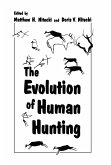An extremely well-organized, conceptually clear, empirically informed, and carefully argued volume...What makes this contribution special is the invigorating infusion of a wealth of principles and knowledge derived from evolutionary biology, neurophysiology, and cognitive science...The chapters provide abundant material for animated discussion.'' --- Evolution and Human Behavior, September 1997 When engaging in laboratory and field studies, researchers have an extensive set of implicit assumptions that justifies their research. However, these assumptions are rarely made explicit either to the researchers themselves, to their colleagues, or to the public. In this fascinating volume, the author gives insight into these underlying beliefs that scientists have regarding moral and biological issues involved in human life-such as decisions that influence reproductive practices, the termination of life, and the pursuit of biomedical research. He then uses this descriptive base to develop an ethic based on rational liberalism. His arguments stem from the thinking of biologists, moral philosophers, cognitive scientists, and social and developmental psychologists.








